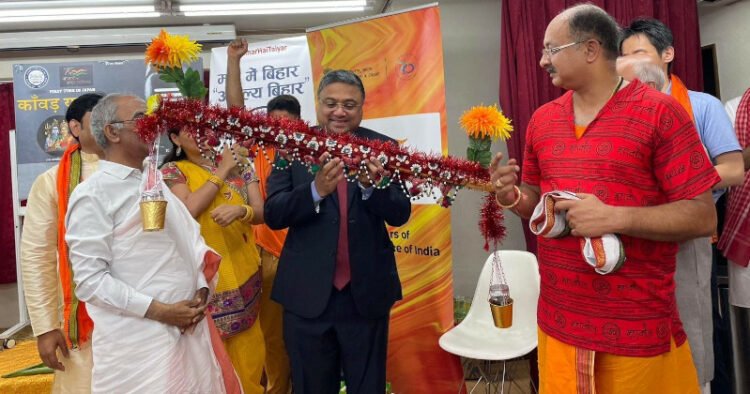An 82 Kilometer-long Kanwar Yatra was organised in the month of Sawan in Tokyo, the capital of Japan. This journey has been possible due to the untiring efforts of the Bihar Foundation Japan Chapter.
Last year also Bihar Association of Japan organised Kanwar Yatra in Japan.
Around 500 devotees took part in this Kanwar Yatra from Tokyo to Saitama. Not only people from India but from neighbouring countries, Nepal, Sri Lanka etc., also took part in this Kanwar Yatra.
The Kanwar Yatra was taken out from Funabori ISKCON Temple Tokyo, in which devotees performed Jalabhishek at Baba Bholenath Temple located in Saitama, a suburb 64 km from Tokyo, with Ganga water sourced from Sultanganj and Haridwar.
It was first launched in Japan in 2022. Anand Vijay Singh, President, Bihar-Jharkhand Association Japan said, Kanwar Yatra is of immense importance as a social and cultural gathering, which unites individuals in their spiritual quest. Through this journey, people also adopt the rich traditions and cultural heritage of their forefathers and also inspire the coming generation.
Ambassador of India to Japan and India’s Ambassador to Japan CB George started the yatra by lifting Kanwar after duly worshiping Kalash. Along with this, Deputy Ambassador of Indian Embassy Mayank Joshi and Principal Secretary Manoj Singh were also present.
Appreciating the members of Bihar Jharkhand Association, Ambassador said that Kanwar Yatra is a living example of unity, trust, dedication and faith in today’s times.
Promoting Community ties, the Bihar-Jharkhand Association of Japan is a non-profit organisation whose objective is to promote the cultural, social and educational interests of the Bihar and Jharkhand community living in Japan.
Anand Vijay Singh, President of the association said, organising Kanwar Yatra in Japan not only as a pilgrimage, but also serves as a platform for cultural exchange and harmony. It reflects aspirations to nurture the Indian roots and spiritual traditions while living in Japan. Kanwar Yatra is an initiative to continue the tradition and preserve the cultural and spiritual heritage.



















Comments